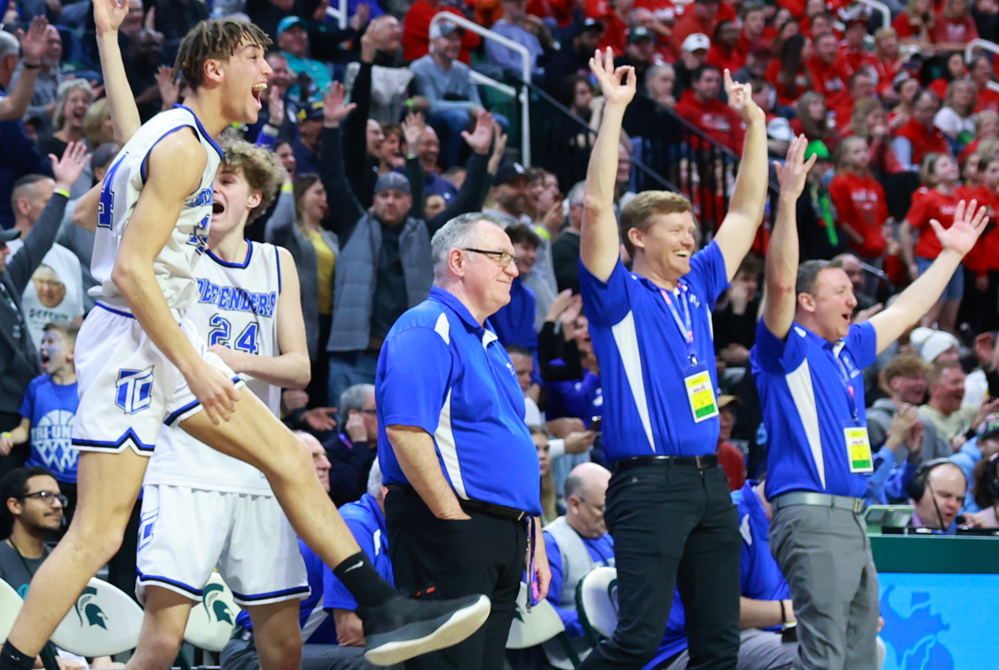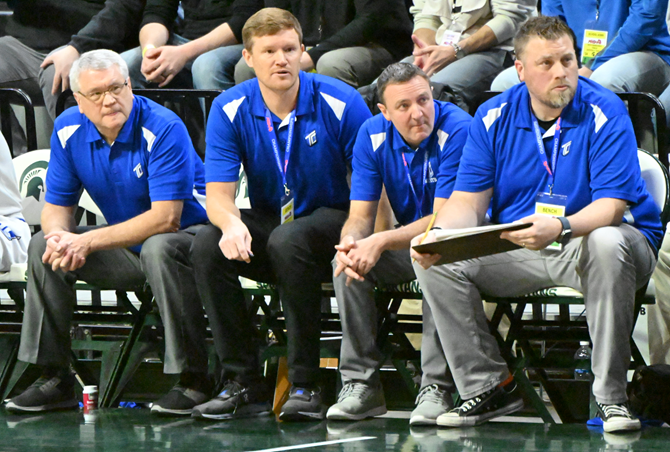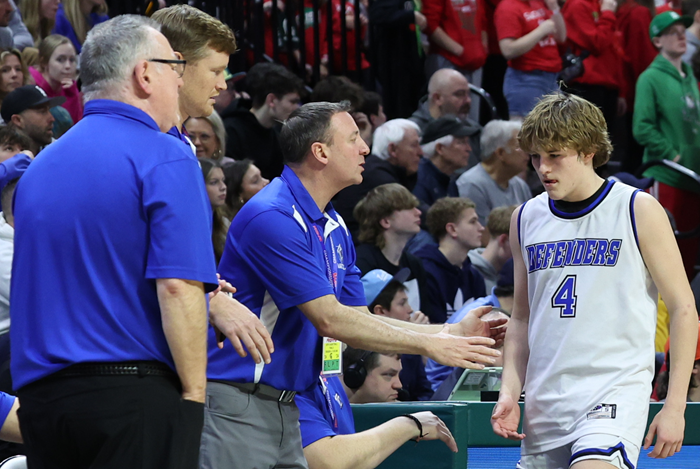
Launching Pad and Destination
November 30, 2012
By Rob Kaminski
MHSAA benchmarks editor
Lamont Simpson’s “home” is a place he visits twice a week during his peak season, when NCAA Division I officiating duties have him navigating the Midwest like a person in a race for frequent flyer miles.
His travels pale in comparison to Stacey Thomas, who has lived in Latvia, Turkey and Sweden thanks to the game of basketball.
Then there’s Jim Garofalo, who authored his own cheat sheets to assist with the eight different rules books which intertwined during a period of time in his hockey officiating career, which included a trip to the Olympic Games.
So, naturally, there’s Simpson officiating an MHSAA Pre-District Football Playoff game in Detroit last fall, taking a postgame earful from a father who believed his son was the subject of a cheap shot during the game.
There’s Thomas, blowing a whistle with teenagers at the Healthy Kids Club in Detroit this summer
There’s Garofalo, ditching seven of the rules books over the last few years, and using only one now: the high school rules book.
It’s true that Simpson is at the pinnacle of his career, working Big Ten, Mid-American Conference and Horizon League men’s basketball, in addition to the WNBA in the summer, where he recently worked his eighth straight WNBA Finals.
And, yes, Thomas has her sights set on the NCAA Division I level and beyond, as her officiating career is still in its infancy.
Sure, Garofalo has achieved much on the ice both as an amateur and professional referee.
But, like so many in the officiating family, they deeply appreciate their roots and the people who helped them along the way. It’s a people business, first and foremost.
This week, continuing its "Making – and Answering – the Call" series, Second Half introduces Simpson, an officiating veteran of more than three decades. Profiles of Thomas and Garofalo will follow later this month.
It's about patience and honesty
The late June heat at the Kensington Valley Golf Course doesn’t seem to bother Lamont Simpson. The secret to his cool aura lies in his hand, a golf ball which he has identified as “Ref” in permanent marker.
Simpson is indeed a ref – permanently – thanks to a suggestion from Robert Menafee during the late 1970s, and the 1977 Detroit Redford grad has been most comfortable in the heat of competition’s spotlight ever since.
“I was at a football game at Henry Ford a year or two after high school, and Mr. Menafee, my former coach, saw me and asked what I was doing,” Simpson recalled. “He said I should try officiating. That’s the first I’d ever thought about it.”
It would be the impetus to a craft that has consumed nearly 30 years of Simpson’s life, as he now jets around the country as a top-flight NCAA Men’s Basketball official, and one of the senior officials in the WNBA, where he recently called his eighth consecutive Finals.
For all of his accomplishments, Simpson can still recall with great detail various moments that led to his current standing; mental snapshots which help to explain why he still registers as an MHSAA football official each year, and why he gives so freely of himself to anyone interested in getting a start in officiating.
“I still remember my first game, thinking, ‘I can’t believe I’m doing this,’” Simpson recalled. “In my second year I did a PSL (Detroit Public School League) playoff game, and to this day, walking into that gym is still one of my most gratifying times. There were about two or three thousand people in the stands, and I remember the butterflies.”
Fast forward to the Pontiac Silverdome in November 1992. In the waning seconds of the MHSAA Class A Football Final, a pigskin floats in the air doing its best butterfly imitation. Following a double-reverse pass, the tipped ball is finally corralled by Muskegon Reeths-Puffer’s Stacey Starr at the 10-yard line and carried into the end zone to give his school a 21-18 win over Walled Lake Western in one of the most frenzied finishes in MHSAA Finals history.
Simpson had a good view of the moment.
“I was the back judge, working my first MHSAA Final. My first thought is to get in position and then, ‘Oh man, the ball is tipped,’” Simpson replays in his mind. “You’re part of a game-ending situation and you don’t want to screw it up. You almost become a fan in a game like that—a moment like that—but you’ve got your job to do. Afterward, when it was all over, I just remember thinking, ‘What a football game I got to be a part of.’”
 Simpson would also get a shot as a Football Final referee in 2003, and worked the 1995 Boys Basketball Final which featured Flint Northern’s team led by future MSU Spartans Mateen Cleaves and Antonio Smith. But, Simpson remembers that game for a different reason.
Simpson would also get a shot as a Football Final referee in 2003, and worked the 1995 Boys Basketball Final which featured Flint Northern’s team led by future MSU Spartans Mateen Cleaves and Antonio Smith. But, Simpson remembers that game for a different reason.
“It was the last time that the Final was worked with a two-person crew.” Simpson said. “I remember the great athletes in the game, and being part of history as the last two-man crew in the Finals is something to be proud of.”
Simpson is quick to point out, however, that simply having what it takes to officiate an athletic event at any level is something of which to be most proud. While it’s natural for new officials to covet championship assignments and careers beyond the high school level, Simpson stresses patience, hard work, and – in many cases – honesty with one’s own performance as the most valuable traits an official can possess.
“I work and speak at a lot of camps, and I stress that people need to work at the craft – mechanics, rules, physical appearance – and above all have patience.” Simpson said. “The thing I see in younger officials now that is so different than when I was coming in, is they don’t have the patience; they don’t want to pay their dues.”
Sometimes, even the greatest amount of patience, perseverance and hard work isn’t enough. And, that’s where honesty in self-evaluation comes in. Yes, there are egos in officiating. To some extent, it’s a prerequisite. However, humility can also lead to finding a niche in the game.
Simpson himself is an example.
“My goal was to work in the NBA, but after seven years in the CBA, I realized that it probably wasn’t going to happen,” he said. “But, you know, there was still a lot of good basketball out there to work. When I left the CBA, I did so on my own terms, and went to work on my college career. So, sometimes you weigh your options and focus on the next goal.
“The point is, work at being the best at whatever level you work. I’ve seen guys spend a lot of money at the same camps year after year, and never get that college assignment,” Simpson said. “Maybe it’s time for them to focus on a different level.”
In that respect, the very thing that drives officials and gets them in the game in the first place can by the very thing that drives them out. Passion and drive, the need to reach the next level, can keep people focused in their chosen quest; the frustration of not advancing can also lead to their exit.
True, Simpson is one of 32 officials in the WNBA, and just worked his eighth WNBA Final. He has a full NCAA Division I men’s basketball schedule. But, the father of three grown children and grandfather of five cannot express enough the fringe benefits that officiating brings at any level.
“You become a better people person through officiating. Your communication skills are sharper,” he says. “Not only what to say and when to say it, but you learn to listen. You have to be a listener in this business, and that’s a great skill to have in life.”
It also provides the opportunity to be a teacher and recruiter. It’s one of the reasons he’s closing in on nearly three decades as an MHSAA registered official. What better way to pass the knowledge forward?
“No matter where you end up, always remember where you started, and keep your friends,” Simpson said. “I return every call, every text. I still talk to the same guys I grew up with. From an officiating standpoint if we could all just bring along one person at a time, think of the effect that would have.”
Simpson does more than his share, from speaking at camps and clinics – all voluntarily, mind you – to the behind the scenes recruitment, such as the time he surrendered all of his baseball umpiring equipment to a friend under the condition that person register with the MHSAA and begin working games.
He thinks back to the suggestion from Coach Menafee frequently. “Oh, all the time,” Simpson said. “I think of the places I’ve been, the things I’ve seen, the people I’ve met and the person I’ve become. This is what being an official does.”
There’s a scenario that Simpson replays time and again when he talks of officiating, and it doesn’t pertain to his collegiate or professional experience. In fact, it’s not even about basketball.
“It’s Friday night, and you’re working the big rivalry game between two communities. You get on the field, the bleachers are packed, the bands are playing, and you’re right in the mix,” Simpson says with reverence. “That’s it right there. It doesn’t get much better than that. That’s it.”
PHOTO: Lamont Simpson officiates WNBA games during the summers, including this contest involving the Atlanta Dream and player Erika de Souza (14).
NOTE: This is the fifth installment in the series "Making – and Answering – the Call" detailing the careers and service of MHSAA officials. Click the links below to view the others.

Championship Experience from Coach's Point of View Unimaginable, Unforgettable
By
Dean Holzwarth
Special for MHSAA.com
April 4, 2024
WYOMING – As the final buzzer sounded, it was all I could’ve imagined – and more.

In the weeks leading up to March 16 and the Division 4 championship game, I experienced every emotion possible as I envisioned what it would feel like to be an assistant coach on the bench at Michigan State’s Breslin Center as the Wyoming Tri-unity Christian boys basketball team achieved its ultimate goal.
In my first year as the junior varsity coach at Tri-unity, I had been on the varsity bench for a majority of the season, assisting legendary coach Mark Keeler and fellow assistants Brent Voorhees, Bob Przybysz and Mike Kaman.
I was there encouraging, motivating and supporting the varsity team. It was a role I embraced, and had become accustomed to over my almost 30 years coaching high school basketball.
I started coaching in 1995 as Jim Ringold gave me my first opportunity as the freshmen girls coach at Wyoming Kelloggsville High School. I would then coach Kelloggsville’s freshmen boys team for eight seasons, while also coaching the freshmen girls at Grandville High School. I would also coach the junior varsity teams at both schools.
I love coaching. I have a passion for it. I’ve always enjoyed getting the most out of my players while creating a bond between player and coach.
When girls basketball season moved from fall to winter joining the boys in 2007-08, I stayed at Grandville. I spent 21 seasons there before stepping down.
I still wanted to coach, and I heard that the Tri-unity junior varsity position was available. I had always respected and liked Keeler and was excited for the prospect of joining a perennial powerhouse.
I didn’t really know about Tri-unity growing up in the Wyoming Park school district. But as a young kid, I would rush home and eagerly await the afternoon delivery of the Grand Rapids Press. I would quickly find the sports page and read it from front to back, hoping one day to see my byline.
I began writing for the Press’ sports department in 1997. It was my dream job. And that’s also when I first started covering Tri-unity boys basketball.
I remember watching eventual NBA all-star Chris Kaman, along with Bryan Foltice and others play for this little Christian school and have unbridled success under Keeler.
MHSAA Tournament runs became the norm for the Defenders. They won their first Finals title in 1996, and they would claim four more over the next 26 years. They also had six runner-up finishes.
 I was sitting on media row writing for MHSAA.com in 2022 when Brady Titus led Tri-unity to its fifth state championship.
I was sitting on media row writing for MHSAA.com in 2022 when Brady Titus led Tri-unity to its fifth state championship.
I never thought that two years later I would be on the coaching staff as the Defenders pursued another one. But there I was.
I knew this year’s team had the potential to be special.
Tri-unity had returned four of its five starters from a year ago, after suffering a heart-breaking two-point loss to Munising in the Division 4 Final.
Eight seniors were on the roster. The team had a mix of talented guard play, senior leadership, size and depth. We had shooters and we played great defense, a trademark of Keeler’s teams.
This was the year, and that heaped lofty expectations on Keeler and the team. It was basically “state championship or bust.” Anything less would be considered a disappointment.
Keeler wanted it badly, and I knew the players did as well. I think they felt the pressure at times of living up to the expectations that had been set.
We had several lopsided wins, but also had a few tough losses to Division 2 and Division 3 teams – Grand Rapids Forest Hills Central, Wyoming Lee, Grandville Covenant Christian and Schoolcraft – all talented teams that I think made us better despite falling short.
As the postseason started, there was anxiety and excitement.
We were one of the favorites, but it wouldn’t be easy. We would have to earn each of the seven victories needed to win it all.
First came a District title, but then we had to play a quality Fowler team in its home gym in the Regional Semifinal. This was a game we knew would be a challenge – and it was.
We led by only one at halftime after a 7-0 run to end the second quarter. The score was tied 33-33 in the fourth quarter before senior Lincoln Eerdmans made a key 3-pointer to spark our victory.
As we went through the handshake line, several Fowler players said, “Good luck in the Finals.”
Our defense played extremely well in the Regional Final and state Quarterfinal to secure our team another trip to the Breslin.
St. Ignace was our opponent in the Semifinal, and we had to face a senior guard who could do it all – Jonny Ingalls. He lived up to the hype. He was good, and we didn’t have any answer for him in the first half. We trailed by one, only to fall behind by seven late in the third quarter.
Was this the end? Were we going to fall one game short of our goal?
 We were down by five points in the fourth quarter, but junior guard Keaton Blanker, and others, rose to the occasion. We rallied to win a tight one, and now we were one win away from a Division 4 title.
We were down by five points in the fourth quarter, but junior guard Keaton Blanker, and others, rose to the occasion. We rallied to win a tight one, and now we were one win away from a Division 4 title.
The night before the championship game, we stayed at a hotel in East Lansing as we had the first game of the day at 10 a.m. We had a team dinner, and the players seemed relaxed and eager to close out the season the way they had intended.
There was one thing that worried me. We were playing Mount Pleasant Sacred Heart. A team we had played in the second game of the season and defeated by 30 points.
Would we be overconfident? I had no idea. They were a different team now, but so were we. Anything could happen.
Keeler gave a spirited and emotional pregame speech. In last year’s loss to Munising, he felt like the team played not to lose, and this season his big thing was “I want to win.” He said it to every starter that Saturday morning during the final moments in the locker room before tipoff, asking all five individually to say it back – which they did, the first one quietly but followed by teammates replying louder and louder as everyone got fired up and “I want to win” rang through the locker room. I think it inspired all of us.
After a competitive first quarter, we started to find our rhythm and expanded the lead. We were ahead by double-digits at the half, and a state title was within our grasp. Senior Wesley Kaman buried a 3-pointer in the final seconds of the third quarter to give us a 20-point cushion. It was at that point I knew we were going to win.
All five starters reached double-figure scoring, led by Jordan VanKlompenberg with 19 points and Owen Rosendall with 14. That balance was intentional and a successful sign for our team all season.
The exhilaration of winning was intoxicating. I loved watching the boys celebrate something they had worked so hard to accomplish. I will never forget their faces. I looked to my right from my seat on the bench and watched them running onto the court, just wearing their joy. They were just elated.
I was so happy for Keeler, a devout Christian who is respected by so many people in high school basketball circles. I learned so much from him this season. The way he approaches each game, his competitiveness. He instills his strong faith in his players and understands that the game of basketball is a bridge to a higher purpose.
Keeler is the fourth-winningest coach in state boys basketball history with a record of 694-216, and will be the winningest active coach next winter as all-time leader Roy Johnston retired from Beaverton at the end of this season.
The tournament run was one of the best coaching experiences I have had, and I feel blessed to have had the opportunity to be a part of a state championship season.
 Dean Holzwarth has covered primarily high school sports for Grand Rapids-based WOOD-TV for five years after serving at the Grand Rapids Press and MLive for 16 years along with shorter stints at the Ionia Sentinel and WZZM. Contact him at [email protected] with story ideas for Allegan, Kent and Ottawa counties.
Dean Holzwarth has covered primarily high school sports for Grand Rapids-based WOOD-TV for five years after serving at the Grand Rapids Press and MLive for 16 years along with shorter stints at the Ionia Sentinel and WZZM. Contact him at [email protected] with story ideas for Allegan, Kent and Ottawa counties.
PHOTOS (Top) The Wyoming Tri-unity Christian bench, including the author (far right) and head coach Mark Keeler (middle), celebrate a 3-pointer late in the Defenders’ Division 4 championship win over Mount Pleasant Sacred Heart. (Middle) Tri-unity’s assistant coaches, including Holzwarth (second from right), monitor the action. (Below) Holzwarth and the coaching staff greet Keaton Blanker (4) as he comes off the floor. (Photos by Hockey Weekly Action Photos.)

